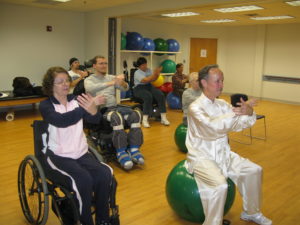Improve Multiple Sclerosis Symptoms with Tai Chi
By John M. de Castro, Ph.D.
“The slow, repetitive weight-shifting movements and emphasis on maintaining an erect spine in tai chi help improve balance. People with multiple sclerosis (MS) tend to compensate for dysfunctional body systems by relying heavily on other systems. It’s therefore important to strengthen joint position sense — the sense of how your joints are positioned — and gain muscle control.” – Elizabeth Bowers
Multiple Sclerosis (MS) is a progressive demyelinating disease which attacks the coating on the neural axons which send messages throughout the body and nervous system. It affects about 2 million people worldwide and about 400,000 in the U.S. It is most commonly diagnosed in people between the ages of 20 and 50 years. Unfortunately, there is no cure for multiple sclerosis. There are a number of approved medications that are used to treat MS but are designed to lessen frequency of relapses and slow the progression of the disease, but they don’t address individual symptoms.
Although there is a progressive deterioration, MS is not fatal with MS patients having about the same life expectancy as the general population. Hence, most MS sufferers have to live with the disease for many years. So, quality of life becomes a major issue. Quality of life with MS is affected by fatigue, cognitive decrements, physical impairment, depression, and poor sleep quality. There is a thus a critical need for safe and effective methods to help relieve the symptoms of MS and improve quality of life. Mindfulness has been previously shown to improve depression, sleep quality, cognitive impairments, emotion regulation, and fatigue. Tai Chi is a mindfulness practice that is also a gentle exercise. It is gentle enough that it doesn’t increase body temperature which can exacerbate MS symptoms. In addition, Tai Chi has been shown to reduce pain and improve balance, reducing falls. So, it would seem likely that Tai Chi might be effective in improving the quality of life and lessening fatigue in patients with multiple sclerosis.
In today’s Research News article “Tai chi for health benefits in patients with multiple sclerosis: A systematic review.” See summary below or view the full text of the study at:
https://www.ncbi.nlm.nih.gov/pmc/articles/PMC5300172/
Zou and colleagues reviewed the published research literature (10 studies) investigating the effectiveness of Tai Chi practice for patients with Multiple Sclerosis (MS). They found that the published studies provided evidence that Tai Chi practice is safe and beneficial in improving the symptoms of MS. In particular, the literature suggests that Tai Chi practice improves flexibility, leg strength, gait, balance, and quality of life, and reduces pain. Although some evidence exists that it also reduces fatigue, the findings are inconsistent.
The research to date appears to support the use of Tai Chi practice to help improve the symptoms of Multiple Sclerosis. An important characteristic of Tai Chi practice is that it is safe, rarely having any adverse consequences. Once learned, it can also be practiced without professional supervision at home or in social groups. This makes it inexpensive and convenient, and perhaps even fun, improving the likelihood of long-term engagement in practice. This is particularly important as MS is a life-long non-fatal disease. Hence, Tai Chi practice would appear to be an excellent mindfulness practice for the improvement of the quality of life of patients with MS.
So, improve multiple sclerosis symptoms with tai chi.
“Tai Chi posture, has recently been shown in a number of random controlled trials to improve balance, posture, vigour and general well-being in a variety of client groups. These are problems commonly encountered by people with Multiple Sclerosis. Some studies have suggested that Tai Chi is also beneficial towards managing spasticity.” – MS Unites
CMCS – Center for Mindfulness and Contemplative Studies
This and other Contemplative Studies posts are also available on Google+ https://plus.google.com/106784388191201299496/posts and on Twitter @MindfulResearch
Study Summary
Zou, L., Wang, H., Xiao, Z., Fang, Q., Zhang, M., Li, T., … Liu, Y. (2017). Tai chi for health benefits in patients with multiple sclerosis: A systematic review. PLoS ONE, 12(2), e0170212. http://doi.org/10.1371/journal.pone.0170212
Abstract
The aim of this systematic review was to evaluate the existing evidence on the effectiveness and safety of Tai chi, which is critical to provide guidelines for clinicians to improve symptomatic management in patients with multiple sclerosis (MS). After performing electronic and manual searches of many sources, ten relevant peer-reviewed studies that met the inclusion criteria were retrieved. The existing evidence supports the effectiveness of Tai chi on improving quality of life (QOL) and functional balance in MS patients. A small number of these studies also reported the positive effect of Tai chi on flexibility, leg strength, gait, and pain. The effect of Tai chi on fatigue is inconsistent across studies. Although the findings demonstrate beneficial effects on improving outcome measures, especially for functional balance and QOL improvements, a conclusive claim should be made carefully for reasons such as methodological flaws, small sample size, lack of specific-disease instruments, unclear description of Tai chi protocol, unreported safety of Tai chi, and insufficient follow-up as documented by the existing literature. Future research should recruit a larger number of participants and utilize the experimental design with a long-term follow-up to ascertain the benefits of Tai chi for MS patients.
https://www.ncbi.nlm.nih.gov/pmc/articles/PMC5300172/
